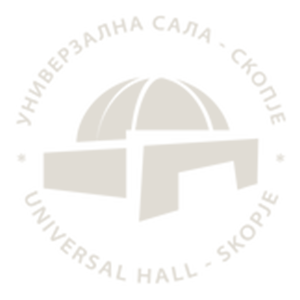Kole Nedanoski has been a beekeeper for about ten years now. He encountered bees at his early age when he was bitten by the neighbours’ bees, after which he developed an allergic reaction. Then, ten years ago, when he has been bitten again, he realized that he was no longer allergic. This encouraged him to start practising beekeeping as a hobby.
He keeps his bees in crates in his yard and produces honey and other products for personal use. In years when he produces larger quantities of bees’ products, he shares them with his friends. Kole believes that beekeeping is not an easy hobby and that it requires constant learning. In the beginning, the practice requires mentorship from a more experienced beekeeper. Kole also attends seminars and lectures led by experts from all over the Balkans regularly.
Breeding bees in urban areas
Kole says that beekeeping is becoming a common hobby in urban areas and that people are increasingly keeping bees in their backyards, rooftops, and hotels. The bee is a wild insect and it can attack, which is why it should be approached very carefully and responsibly. Bees have always been bred in the Balkans. At the beginning that was done in a primitive way wherein the process of extracting honey destroyed whole bee colonies. Later on, the keeping of the bees was organized in beehive boxes, which ensured their survival.
The bee is an endangered species due to the chemicals and the insecticides used to spray plants, especially those still used in our country, and that are actually banned in the rest of Europe. At the same time, the bees are dependent on us. Two to three decades ago, a tick appeared which, due to the strong treatment with insecticides, passed on to the bee to survive. The tick damages its chitin layer and makes the bee less resistant to viruses and bacteria, reducing its vitality and leading to extinction and wiping of entire bee colonies.
How do bees live?
Bees have a high social organization and every bee knows its job. Once they hatch, their first job is to keep the young bees, carry water, and do other things during their short lives. For example, the summer bee lives for 40 days, and if the conditions allow, it can produce a spoonful of honey during its life. For us it is just a spoon, for the bee, it is a lifetime. The winter bee that hatches in August and September, lives for about 6 months, but the queen can live 5 to 6 years, being most productive in the first year. If the queen does not perform her function, she can be replaced. A queen can lay up to 3.000 eggs per day in good conditions, which is more than her total weight.
Bee products
Besides honey, bees can give other products, such as propolis, pollen, wax, perga, royal jelly.
Perga, also referred to as bee bread, is fermented pollen processed by the bees and enriched with their enzymes and other high-value substances. Propolis is also very important, and there are no bacteria resistant to it.
The honey is used preventively, for maintaining and boosting immunity. Each honey has different properties and has various purposes. For example, chestnut honey is used for healing the lungs. There are different types of honey for different diseases. The honey can be rubbed on the wounds as well so that no scars remain. Now, there is the commonly used apitherapy that is similar to acupuncture, which treats tuberculosis and various airways diseases. The origin of honey is examined in a laboratory, by detecting the tree from which the pollen was extracted. If there is linden in the honey, we know that it comes from Europe. If there is eucalyptus, then it is from Australia.
The largest honey producer is China, and their honey is mostly produced artificially. Often the price of honey in markets can be lower because that honey was not produced naturally but artificially. Honey should be bought from a beekeeper that you trust. The easiest way to check if the honey is good is to put a drop of it on a piece of paper. If the honey is natural it will not pass through the paper, which means that there is no water in it. Another way to find out if the honey is real is if it crystallizes, which means it was made naturally and does not mean that it spoiled. Honey shouldn’t spoil and it doesn’t have an expiration date. To last longer, it must be stored in tightly-sealed jars and not exposed to temperatures higher than 50 degrees, because it will lose its properties.
Allergies can be treated with small, micro doses of pollen grains taken from the environment in which the patient lives and is allergic to.
Lately, bee venom has become quite popular. It is very difficult to collect and therefore has a high price. Glass and special low-voltage devices are placed at the entrance of the beehive, which stings the bee, and in defence, the bee releases a micro drop of venom, which is then taken by scraping the glass with a razor. The bee venom is used in medicine and cosmetics. The price of a kilogram of bee venom is more expensive than a kilogram of gold.
Climate change and the human factor in the destruction of bees
Climate change has a strong negative impact on the bee. Beekeepers from all over the Balkans are very concerned about this problem. They used to have a hundred boxes and now they are left with two or three. If the winter months are warm and nature is still undeveloped, the bees wake up earlier and have nowhere to feed. Also, if nature wakes up in the spring followed by a period of low temperatures with ice, they destroy the bees, leaving empty cages. The bee is massively disappearing in the world, which is a result of human neglect of nature in general. Chemical insecticides should be substituted with ones of biological origin to avoid major damage to nature, including bees. Plastic pollution of land and water is also a huge problem. In the food race, we forget where we come from and we go against nature. Many insects are destroyed every day and thus the normal natural chain is imbalanced.
Still, Kole is optimistic about the bee’s survival and believes that we should seriously work on raising awareness among people. He recommends that each family should keep a beehive.
On behalf of the SKOPJE 2028 team, Manja Velichkovska and Sonja Stavrova talked with Kole Nedanoski. All photos by Sonja Stavrova.


